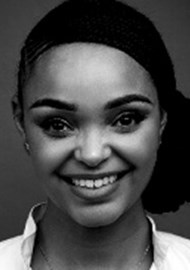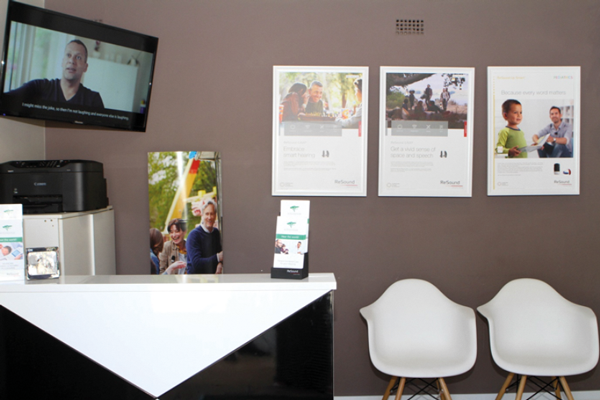
Audiovannah reception area.
In 2015 two Danish audiologists, Jenny Pedersen and Nicolai Pedersen, relocated to Zimbabwe and opened a full service audiology clinic (Audiovannah) in the capital city of Harare. The focus has been to give back as much as possible to the local community while securing sustainability in a country where the need is high, but awareness and availability is extremely low. This article outlines the considerations made and the challenges faced in setting up and sustaining an audiology service in an African country.
Ninety percent of all new cases of significant hearing loss are reported in developing countries [1], of which sub-Saharan Africa accounts for 46 out of 164 countries. The need in African countries has resulted in a large focus on humanitarian work in health related fields, including audiology. Coming from a saturated European market with the highest penetration level in the world (Denmark), the need for audiological services in Zimbabwe is very apparent.
Zimbabwe has only five registered / practising audiologists and three technician-level hearing aid dispensers. For a country with 14 million inhabitants, this number of clinicians in the audiology field is extremely low. In some cases you would assume that if there is no competition, there may be no real need for the service you are providing.
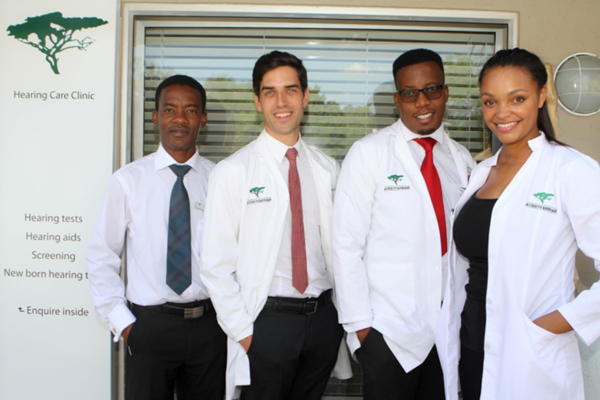
Audiovannah team [l-r] Prince Shumba (Administration Manager), Nicolai Pedersen (Audiologist),
Mkhonzeni Sibanda (Audiologist), Dr Jenny Nesgaard Pedersen (Audiologist).
The country has been subject to young people studying abroad and not returning with their expertise. The need is overwhelming. Awareness about audiology, hearing and the link to language development is very low. In many cases when parents raise concerns about their child’s hearing and development, the message from the general practitioners is to wait until the child is school aged.
“Help is indeed needed and appreciated, but not at any cost.“
Audiovannah is a full service audiology clinic offering screening, testing and rehabilitation for hearing and balance disorders for patients of all ages. The clinic currently sees 25% of all cases on a pro-bono basis and the aim is to increase that number to 50%. All babies aged 0-6 months are screened for free, all children under the age of 18 can apply for (parent) income based help to cover the cost of amplification and over 18s receive rehabilitation free of charge on a case by case basis. But for all of this to be sustainable the clinic must generate a steady income.
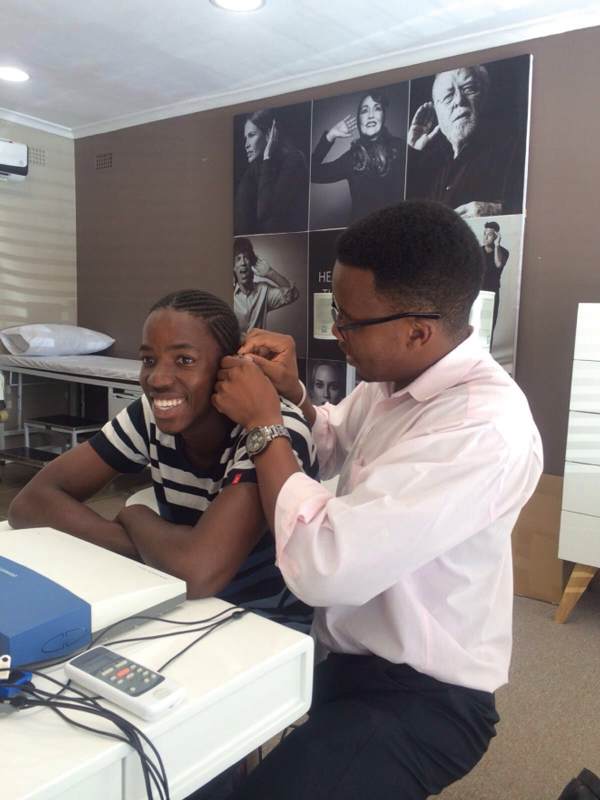
Pro bono patient receiving hearing aids at Audiovannah.
A few things have become very clear in attempting to build a business model which centres on giving away as much as possible for free. In Denmark, as in most of the developed world, many audiologists are finding that they have to do testing for free in order to be competitive in their market (much like the development in the field of opticians). This makes hearing aid sales the source of income with little to no value being put on the diagnostic skills that hearing specialists studied to obtain. In the long run this is not very satisfying and patients tend to doubt skills they can access for free. It was decided that this would not be the way to model the Harare clinic. Patients would need to pay to access the expertise.
A concept that is quite prevalent in this market is the “Local Mark Up”. This is based on the philosophy that since people cannot access the service or purchase the goods elsewhere; this is a sellers’ market with prices in excess of twice the amount for the same item / service. In fairness import taxes are very high on most items, but hearing aids benefit from exemption on import tax. It should be reasoned that if pricing is set too high this leaves room for competition to come in and take over the entire client base. This risk is very real here with South Africa as the neighbouring country with a well-established audiology offering.
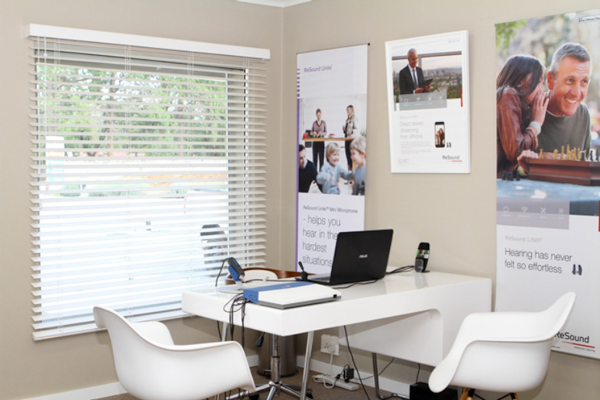
Audiovannah Audiology Consult 2.
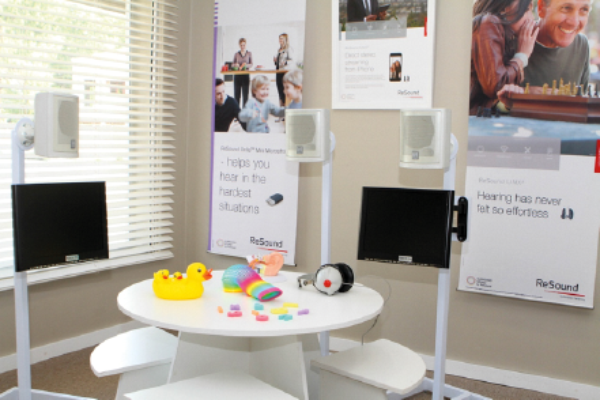
Audiovannah Audiology Paediatric test set-up.
Most middle class households benefit from membership to a medical aid society, and most medical aid societies do cover audiological testing and rehabilitation either in full or in part. This has been the basis for the billing scheme for the services offered in the clinic. Services are charged at the exact rates that the medical aid societies are obliged to reimburse; there are no shortfalls added to those rates. This means being satisfied with receiving the minimum rate that the medical aid societies are willing to pay for services. This also means that more people have access to the service. Receiving payment for services from those who can afford it or who can afford medical aid enables others of less means to be seen free of charge.
“The focus has been to give back as much as possible to the local community while securing sustainability.”
Something else that may be somewhat unexpected is the fact that the health sector in Zimbabwe is extremely well monitored. Setting up the business and securing all the needed registrations and inspections was a process that took almost a year and cost several thousand US dollars. The process was much more involved than the process for opening an audiology clinic in Denmark. The ability to carry out charity work has also been affected by the need for government involvement. It has proven difficult to be allowed to provide help on any larger-scale, with agreements and documentation needed at every level. This stems from past experiences of corporations using Africa as a dumping ground for faulty, out dated equipment and medication while reaping the tax benefits this awards these corporations in their own countries. Help is indeed needed and appreciated, but not at any cost. This has made the initial stages very labour-intensive working, in a system that is well monitored but still reliant on manual bureaucracy.
2016 will hopefully see the initiation of a pilot study to investigate the feasibility of introducing new born hearing screening into the already existing health care structures. It will also be looking at risk factors associated with permanent childhood hearing loss that are prevalent in this community. Identifying and tracking such risk factors will result in data that can be used to justify the allocation of audiology resources within the healthcare system. An audiology degree at the University of Zimbabwe with associated teaching hospital departments is also underway, with the first intake of students expected in 2017. The hope is that in time a sustainable audiology offering will be available and accessible on a countrywide basis.
SUMMARY
Experiencing a country where there is no formal audiology offering highlights the importance of audiology services in a community. Raising awareness about the link between hearing and language development has the power to change lives and save children from the prospect of poverty in adulthood. Running a business in such a market prompts an urge to give back to the community, preferably in a sustainable manner, while building the infrastructure for the field within the country to increase accessibility to audiology services.
References
1. Olusanya BO, Luxon LM, Wirz SL. Benefits and challenges of newborn hearing screening for developing countries. International Journal of Pediatric Otorhinolaryngology 2004;68:287-305.
Declaration of competing interests: Audiovannah (PVT) Ltd receives donation hearing aids from GN ReSound and GN Great Nordic for charitable activities.

